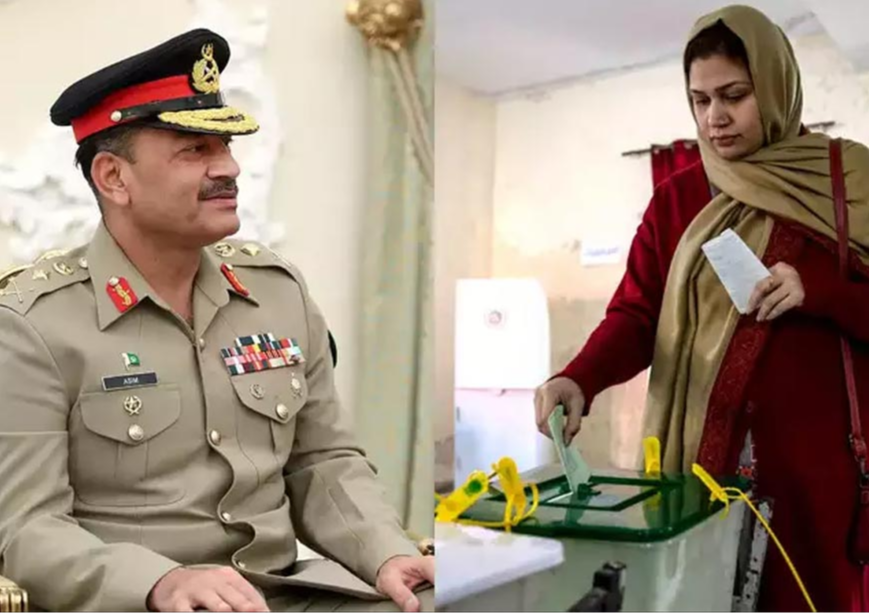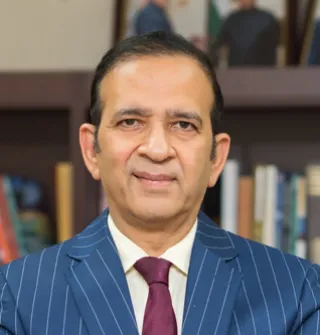-
CENTRES
Progammes & Centres
Location
People have voted against the military’s political favourites but General Munir still gets to cook up the next coalition government

The people of Pakistan braved stiff odds on 8 February to cast their vote. A strong electoral tsunami, led by young voters, coalesced a distinct anti-army mood with deep anger at economic hardship and a sympathy wave for the jailed Imran Khan and his beleaguered PTI. While the PML-N ended up as the largest federal party (with 75 of 266 national assembly seats), but no majority in its home base of Punjab, and the Zardari-Bhutto PPP claimed 54 seats and the home province of Sindh, it was the independents (mostly) backed by the PTI that surprised Pakistanis with over 100 seats. Without poll rigging on election day, they may have crossed the simple majority mark of 134 and without the massive pre-poll manipulation, the PTI may perhaps even have breached the two-thirds level that Imran Khan’s AI avatar claimed.
However, all that remains theoretical. The elections were perhaps the most brazenly rigged ones in Pakistan’s recent history, despite global and social media scrutiny. Analysts in Pakistan expect more uncertainty and post-poll horse-trading, but the country seemed headed for a repeat of the PDM model (as this column suggested) that the army had in place for 16 months, when it booted out Imran Khan in April 2022. With the army failing to deliver the majority Nawaz Sharif hoped he would govern with, the ‘victory’ that he hurriedly announced, ‘will be more bitter than sweet’, the Dawn pointed out. Speculation has arisen that Nawaz may opt to remain the non-playing captain, the party’s ‘Qaid’ accepting a role analogous to Sonia Gandhi’s in India’s UPA government, with his brother Shehbaz as PM and daughter Maryam as CM Punjab, Coalition partner Zardari, still demanding the post of PM for son Bilawal, may settle for the post of President for himself.
Without poll rigging on election day, they may have crossed the simple majority mark of 134 and without the massive pre-poll manipulation, the PTI may perhaps even have breached the two-thirds level that Imran Khan’s AI avatar claimed.
In the next few days, the spotlight would fall on Pakistan’s president (former PTI activist and Imran loyalist) Arif Alvi, (who must invite the largest party to form a government), and the judiciary (which must adjudicate appeals on multiple case of poll rigging filed by PTI candidates, apart from the sentencing of Imran Khan in kangaroo courts). PTI planners would hope to merge their independent candidates into a political party, even the PPP, to become the largest party (and to avail the additional reserved seats available to parties by proportional representation,) but any such deal would face the army’s veto.
Most of all, the outcomes represent a moment of truth for Pakistan’s army chief Asim Munir. The army was still not over the shock of the 9 May events of last year when a popular rebellion by PTI cadres was joined by sympathisers within the army after the arrest of Imran Khan. Pakistan’s people have again sent an angry message through the ballot boxes, protesting the imposition of the army’s imposition of incompetent governments.
Munir did try to propel himself above the electoral fray to ask the civilians to show a healing touch, unity, and maturity. Clearly, the army has so far rejected the Egypt or Myanmar model, of a complete power grab. But it has also not learnt from the Bangladesh model (of the army stepping back in favour of the civilians after elections in 2008), preferring to stick with the uniquely Pakistani model of the post-Musharraf era, where the army has evolved from guided democracy to hybrid democracy, playing the role of the unelected senior partner. While the army always has ready civilians willing to play its game, the voters are pointing out they have seen through it and won’t be fooled.
Munir did try to propel himself above the electoral fray to ask the civilians to show a healing touch, unity, and maturity.
Asim Munir will need to decide on his legacy soon enough. By November 2025, Munir will need to decide what kind of army chief he would like to be. One who would walk into the sunset completing his single term; or arm-twisting the civilians to stay on for six years (par for the course) or for nine plus (requiring a coup and suspension of the constitution and facing international opprobrium).
On his part, Nawaz would need to decide on his own political legacy. He has got sweet revenge for his tribulations and ouster in 2017. His wish for vote ko izzat (respect the vote) was fulfilled. Imran’s relentless army-supported dharnas had in fact kept Nawaz off balance for all of his days as PM from 2013. But now the same Imran is demanding vote ki hifazat (protect the vote) from jail. The army may want to offer Imran political exile or even deploy him as a threat to the new dispensation in the future.
With the political maturity and experience of his three abbreviated PM terms, Nawaz could try and end this game. He may be better off attempting a ‘charter of democracy’ with other political parties, of the kind he had cobbled together with the PPP in 2007 to encourage Musharraf to abandon power. This time, he should include both the PPP and the PTI in a conversation with the army to allow the civilians to run governments, howsoever corrupt or flawed they may appear. Instead of attacking each other, Pakistan’s political parties may see the wisdom of encouraging the army to focus on the country’s myriad security challenges, largely of its own creation. That would be an important step towards a normal Pakistan.
This commentary originally appeared in The Times of India.
The views expressed above belong to the author(s). ORF research and analyses now available on Telegram! Click here to access our curated content — blogs, longforms and interviews.

Ajay Bisaria is a Distinguished Fellow at ORF. He is also a strategic consultant and commentator on international affairs. He has had a distinguished diplomatic ...
Read More +